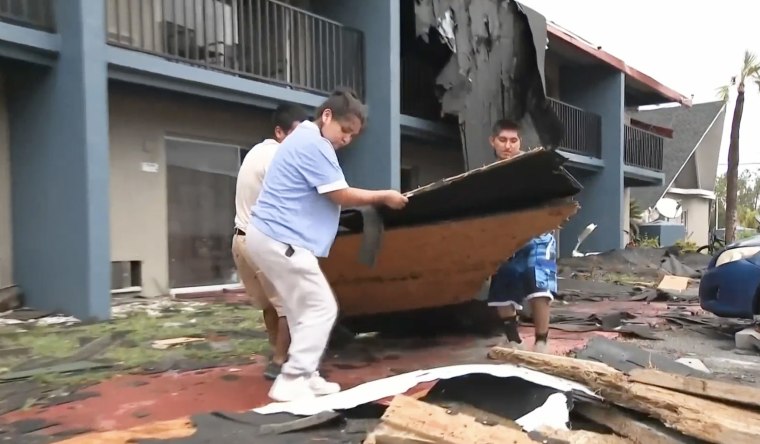Immigrants cleaning up after Hurricane Idalia wonder if DeSantis’ immigration law will limit their ability to rebuild Florida
Florida #Florida

As Florida residents emerged from Hurricane Idalia on Thursday, some have started to assess the trail of destruction the storm left behind — and this included a group of Latinos who started cleaning up the severely damaged hotel where they work.
Alberto, Maggie and Jorge Vidal were among dozens of construction and agricultural workers who sheltered inside a 30-room hotel in the city of Perry. The Vidals had relocated to Florida from Mexico a year ago to work in construction, and Idalia was the first hurricane they’ve ever endured.
“In Mexico, we had never experienced a catastrophe like this,” Jorge Vidal told Noticias Telemundo in Spanish. He recalled hearing the windows of the hotel crack. The wind gusts that seeped in blew everything away, including parts of the hotel’s ceiling, and the rain flooded some of the rooms.
Shortly after the storm passed, the Vidals, who also work in the hotel where they sheltered, started cleaning up the debris and assessing the damage even before the hotel’s manager was able to return to the building, Noticias Telemundo reported.
That’s when it became clear to Maggie Vidal that immigrant construction workers like herself will be key to rebuilding what Idalia destroyed.
Damages from Idalia could surpass $9 billion, according to an estimate from UBS Bank.
 Residents clear debris after Hurricane Idalia in Perry, Fla., on Wednesday.Telemundo
Residents clear debris after Hurricane Idalia in Perry, Fla., on Wednesday.Telemundo
“This is where all the immigrants that the governor wants to push out are needed,” Maggie Vidal told Noticias Telemundo in Spanish. “Who is going to do all of this work? There is a lot, a lot of work here.”
Maggie Vidal was referring to Gov. Ron DeSantis’ stringent immigration law that went into effect July 1. The law, also known as SB 1718, imposes restrictions and penalties to deter the employment of undocumented workers in Florida.
The law makes it a felony to “knowingly and willfully” transport an undocumented person into the state (including relatives and acquaintances), invalidates out-of-state driver’s licenses issued to immigrants who lack legal status and requires hospitals that accept Medicaid to ask about immigration status (though patients may decline to answer the question).
In the last months, some farm and construction workers have moved out the state because of fears around the law.
Before Idalia made landfall in Florida’s Big Bend on Wednesday morning, Latino and immigrant rights organizations in the state worried about the law potentially limiting their ability to help immigrant families prepare for the storm.
Twenty-five of these organizations sent a letter to DeSantis asking him to “issue a public statement suspending immigration enforcement by state and local authorities” in areas where a state of emergency has been declared and where residents are evacuating, sheltering or returning to their homes after the storm.
The U.S. Department of Homeland Security, which oversees the actions of immigration enforcement agencies such as Immigration and Customs Enforcement and Customs and Border Protection, released a statement Tuesday reminding the public that “ICE and CBP do not conduct immigration enforcement activities at protected areas” providing emergency response and relief.
“The well-being and safety of all residents, regardless of their immigration status, should be a top priority during times of crisis,” Paula Muñoz of the Florida Immigrant Coalition, one of the organizations to cosign the letter, said in a statement Wednesday. “We urge Governor DeSantis to demonstrate strong leadership by ensuring that no one is deterred from accessing shelter and necessary assistance due to immigration concerns.”
Shelters are not required to ask anyone about immigration status under SB 1718.
As the Federal Emergency Management Agency responds to Idalia’s aftermath, it clarified that undocumented immigrants do not qualify for federal emergency assistance programs. But relatives who are U.S. citizens and others with green cards, certain visas or other types of immigration protections may be able to access some aid, according to the Florida Immigrant Coalition.
Nicole Acevedo
Julio Vaqueiro, Noticias Telemundo contributed.